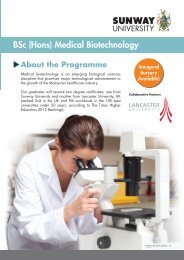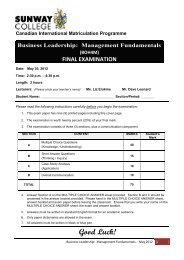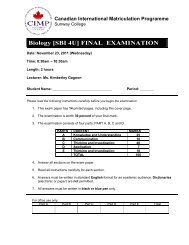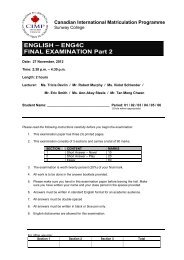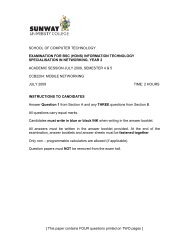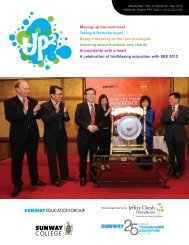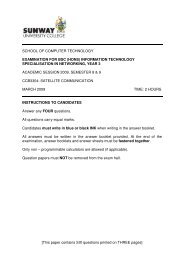Question Booklet - Home | Sunway Education Group
Question Booklet - Home | Sunway Education Group
Question Booklet - Home | Sunway Education Group
Create successful ePaper yourself
Turn your PDF publications into a flip-book with our unique Google optimized e-Paper software.
"t4 1."t'-ITEl\ly<br />
~r-- '"'I"<br />
/' • ''\<br />
~ ~<br />
$CIMP~<br />
?. ON'T ..... RIO ~<br />
..... " CANADA J"<br />
"(,,- 6~<br />
_ SECTION A: MULTIPLE CHOICE QUESTIONS<br />
(40marks)<br />
PLEASE INDICATE YOUR FINAL ANSWER OF YOUR ANSWER SHEET - See p.l of you exam.<br />
1. If a definition of family violates human dignity, that means it<br />
A. restricts those groups that are called families<br />
B. excludes the rights of some individuals and groups<br />
C. causes pain and discomfort but is not illegal<br />
D. excludes groups of people who act as families<br />
2. How has the family become a psychological unit?<br />
A. it is expected to be a refuge from all harm<br />
B. it is expected to meet social and emotional needs<br />
C. it is expected to produce children and to provide for all the needs of its members<br />
D. it is expected to bring meaning to the lives of its members<br />
3. One of the reasons for studying the family is<br />
A. to break preconceptions<br />
B. to determine the effects of divorce on children<br />
C. to determine why people are marrying<br />
D. all of the above<br />
4. Why are a variety of theoretical perspectives needed for studying the family?<br />
A. to cover a wide variety of information<br />
B. to identify points of view based on a specific theory<br />
C. to organize the information gathered about families<br />
D. all of the above<br />
5. Which field of study examines the behaviour of individuals in families and society?<br />
A. sociology<br />
B. anthropology<br />
C. family studies<br />
D. psychology<br />
6. Why is it important to produce demographics about the family?<br />
A. to know how many families are divorcing<br />
B. to create data banks for researchers<br />
C. to assist in planning social policy<br />
D. to explain the behaviour of individuals<br />
1
14. Young adults who live in their parents' home into their late twenties<br />
A. acquire the values and behaviours of their parents<br />
B. are immature<br />
C. have parents who are not willing to let go of their adult children<br />
D. all of the above<br />
15. Research shows that well-adjusted children most often come from<br />
A. rich families.<br />
B. families that live close to good day care centres.<br />
C. parents with a positive parenting style.<br />
D. poor families with two parents in the home.<br />
16. When might resocialization be needed by an individual?<br />
A. when an individual graduates from university<br />
B. when an individual changes jobs<br />
C. when an individual attains midlife status<br />
D. when an individual is involved in psychological research<br />
17. Which method of discipline is preferred by most adolescents?<br />
A. authoritative<br />
B. permissive<br />
C. authoritarian<br />
D. all of the above<br />
18. Which of the following is an explanation of why males and females choose different<br />
types of jobs?<br />
A. differences in interests<br />
B. children's ideas about gender roles are influenced by role models<br />
C. children's ideas about gender roles are influenced by socialization<br />
D. all of the above<br />
19. What is the meaning of individualism?<br />
A. developing independence and self-reliance<br />
B. developing a sense of community<br />
C. developing a duty-based moral code<br />
D. developing a dedication to family<br />
20. Which of the following is not a reason for marriage?<br />
A. to gain adult status<br />
B. to have free labour<br />
C. to have children<br />
D. to have companionship<br />
3
28. Which is not usually a factor in the selection of partners for an arranged marriage?<br />
A. psychological role<br />
B. proximity<br />
c. dowry<br />
D. social role<br />
29. Why do younger women choose older men as partners?<br />
A. older men are sexier<br />
B. older men are wiser and more stable<br />
C. older men are wealthier..and more stable<br />
D. older men are calmer and more stable<br />
30. What does marriage symbolize?<br />
A. a major transition for the purpose of independence and status<br />
B. respect for one's family<br />
C. stability in the relationship with another<br />
D. the love for one's partner<br />
31. When it comes to marriage, what does the law assume?<br />
A. partners assume traditional roles<br />
B. both partners are making an equal contribution<br />
C. law dictates the foundations of the relationship<br />
D. none of the above<br />
32. What is the principle of least interest?<br />
A. the person who has the least commitment to the relationship has the most power<br />
B. the person who is least able to communicate his or her feelings has the most say<br />
in the relationship<br />
C. the person who earns the most money has the power in the relationship<br />
D. the person who does the most work in the household has the most power in the<br />
relationship<br />
33. What type of institution is marriage?<br />
A. social<br />
B. legal<br />
C. religious<br />
D. all of the above<br />
34. Interfaith couples, compared with interracial couples, experience<br />
A. the same set of problems<br />
B. a different set of problems<br />
C. more problems<br />
D. fewer problems<br />
5
.,<br />
SECTION B: MATCHING<br />
(lSruarks)<br />
Match the term with the appropriate definition.<br />
Word List.<br />
A. Rite of Passage<br />
B. <strong>Education</strong> Inflation<br />
C. Free Choice Mate<br />
Selection<br />
D. Cottage Industry<br />
E. Betrothal<br />
F. Theory<br />
G. Extended Family<br />
H. Authoritarian<br />
I. Norm<br />
J. Functionalism<br />
K. Role<br />
L. Polygyny<br />
M. Polyandry<br />
N. Symbolic Interactionism<br />
O. Hunter Gatherer<br />
P. Age of Majority<br />
Q. Feminism<br />
R. Consanguinity<br />
S. Dowry<br />
T. Nuclear Family<br />
U. Agricultural Family<br />
V. Authoritative<br />
W. Normative Event<br />
X. Socialization<br />
Y. Serial Monogamy<br />
Z. Negotiation<br />
1. A band of people, the first family collectives.<br />
2. A promise to marry, often at a young age.<br />
3. Parenting style based on setting strict rules.<br />
4. A family structure that includes husband, wife and their children.<br />
5. A gift given to the husband prior the wedding.<br />
6. A framework for examining observable evidence.<br />
7. A series of monogamous relationship one after another.<br />
8. Theories that illustrate the difference in power between men and<br />
women.<br />
9. Economic activity based in the home.<br />
10. The age at which a person is legal recognized to be an adult.<br />
11. Method of finding a partner using one's own resources, intuition, and<br />
experiences.<br />
12. The average or most often observed behaviours in a society<br />
13. Explains how a society is organized to perform tasks that are necessary<br />
for its survival.<br />
14.<br />
15.<br />
Ceremonies of tasks must be completed to achieve adult status.<br />
It explains how individuals choose to act based on their perceptions<br />
of self and others.<br />
7
• •<br />
.0 .0<br />
c: c:<br />
CD<br />
Ul<br />
cr.<br />
0<br />
:><br />
0<br />
:><br />
:><br />
0<br />
:><br />
0<br />
CD<br />
Ul<br />
cr.<br />
~ ~<br />
U1<br />
U1<br />
3 3<br />
OJ<br />
OJ<br />
.., ..,<br />
......., iri"<br />
......., iri"<br />
\0
0.<br />
(8) Those who do not attend religious services<br />
Those Who Do Not Attend Religious Services<br />
80 I 71 a7<br />
70<br />
_ 60<br />
'"<br />
e.... 50<br />
~<br />
40<br />
~<br />
c:<br />
~ 30<br />
&. 20<br />
10<br />
o<br />
Not at all Occasionally Weekly<br />
Attendance at religious services<br />
~<br />
~<br />
(C) Foreign or Canadian born<br />
Foreign or Canadian~born<br />
70<br />
60<br />
~ 50 j<br />
••<br />
40<br />
~ 40<br />
1: '" 30<br />
~ 20<br />
D.<br />
10<br />
ol--l<br />
Canadian-born<br />
Place of birth<br />
_ 10<br />
Foreign-born<br />
• Women<br />
I~<br />
Common-law unions have increased dramatically over the past 20 years. According to<br />
census data, common-law unions have more than doubled, from 6% of all families in<br />
1981 to 14% in 2001. Using the above charts write a brief response to the following<br />
questions:<br />
1. Discuss the different attitudes between men and women regarding co-habitation.<br />
(Provide an example to help explain your answer).<br />
(1 mark)<br />
11
o<br />
expenses. He moved in and later found a new job. They both work in middle<br />
management positions and earn about the same salary. David pays "rent" that is equal<br />
to half the mortgage, and he pays the utilities. other than that, the couple keeps their<br />
finances separate.<br />
Recently, Isabelle gave David an ultimatum. Either they set a date and start planning a<br />
wedding, or she will have to break off the relationship. David is stunned and hurt. He<br />
loves Isabelle very much and would like to continue with the relationship the way it is.<br />
He says he is committed and doesn't see why a piece of paper is so important. He thinks<br />
he might want to have children some day, but until he is ready for that, he doesn't really<br />
see the benefit of marriage. He wants to wait until they are ready to start a family, but<br />
feels that is a long way off. Isabelle feels that David couldn't really love her if he won't<br />
agree to marriage which she wants so much. She feels rejected and powerless.<br />
Everyday she gets more and more angry and resentful toward David for not giving her<br />
what she wants. Her anger is creating a wedge in the relationship and both David and<br />
Isabelle feel they are growing apart.<br />
<strong>Question</strong>s:<br />
Identify and explain 3 factors that might be affecting David's reluctance to get married?<br />
(For each factor, provide an explanation).<br />
(3 marks)<br />
13



